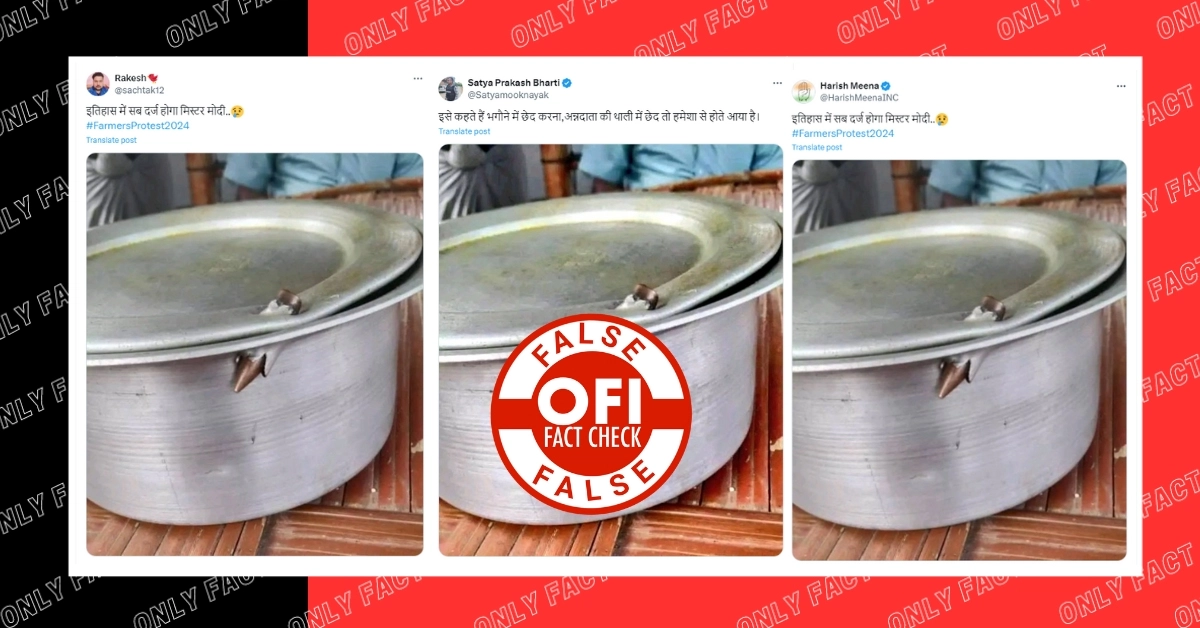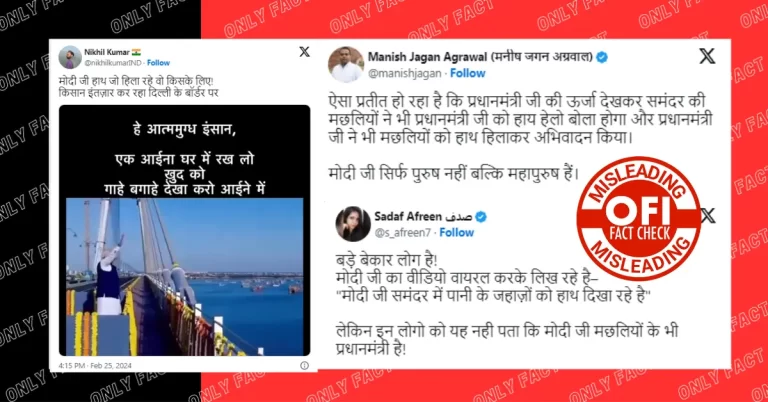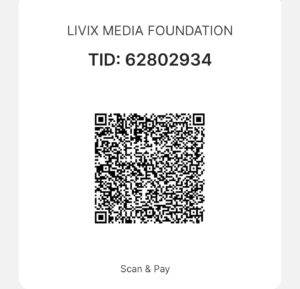Dhruv Rathee, a YouTuber renowned for making videos on subjects that often surpass his understanding, predominantly centering around critiques of the current government, recently extended his scrutiny to question the state of democracy in India. In a comprehensive 30-minute video, Rathee asserted, backed by illustrative examples, that India is teetering on a trajectory towards a state akin to North Korea and Russia. It is worth noting the conspicuous absence of China in his comparative analysis. While vociferously denouncing the Modi government for purportedly stifling free speech, Rathee’s critique is underscored by a poignant irony. His video, despite echoing concerns about democratic principles, is being disseminated among individuals critical of Prime Minister Narendra Modi.
Several individuals have shared Dhruv Rathee’s content, contending that watching his video is imperative for those who wish to prevent India from resembling North Korea and Russia due to purported actions by Prime Minister Modi that are alleged to be undermining democracy. ( Dhruv, Rahul Tahiliani, Newton, Kapil, Amock)
This is the most important video I’ve ever made.
— Dhruv Rathee (@dhruv_rathee) February 23, 2024
Do watch if you really care for the country. Jai Hind 🇮🇳 https://t.co/ze4qaRH5jf
Dhruv Rathee की ये वीडियो ज़्यादा से ज़्यादा लोगों तक पहुँचनी चाहिए… हक़ीक़त बताई है pic.twitter.com/cMv2eLuU3e
— Rahul Tahiliani (@Rahultahiliani9) February 23, 2024
🚨🚨IS INDIA BECOMING A DICTATORSHIP??
— Newton (@newt0nlaws) February 22, 2024
The most awaited video of Dhruv Rathee on backsliding of Indian Democracy has released. This is an eyeopener for India.
Must Watch Full Video here:https://t.co/0q7mQuCVIL pic.twitter.com/oCEEStNoDg
If you are a first-time voter in India, do watch this video!
— Kapil (@kapsology) February 23, 2024
You can stop India from turning into North Korea or Russia through your vote this time.
Next time vote dena ka chance milega bhi nahi, woh pata nahipic.twitter.com/ojSGQUF7Ip
This is a must watch video especially for the BJP voters who feel nothing wrong about govt.
— Amock (@Politics_2022_) February 23, 2024
Dhruv Rathee in just 70 seconds listed everything that proves democracy in dànger.
Watch & share this in groups 🔥pic.twitter.com/NiNsx1LBdQ
In this investigative piece, we will meticulously scrutinize the assertions put forth by YouTuber Dhruv Rathee, evaluating the basis upon which he concludes that the state of Indian democracy is in jeopardy.
Fact Check
Claim 1: Dhruv Rathee, contends that India is on a trajectory toward adopting a one-party-one-election system, further speculating that the country may eventually mirror the election dynamics observed in North Korea and Russia, where elections purportedly favor the ruling government.
Fact: According to the latest records from the Election Commission, India boasts a diverse political landscape with eight national political parties, 55 state-level political parties, and an additional 2597 unrecognized political entities. Notably, the present opposition coalition, named I.N.D.I.A, comprises over 25 political parties, encompassing both regional and national entities such as the Indian National Congress, Trinamool Congress, Aam Aadmi Party, Samajwadi Party, Rashtriya Janata Dal, Communist Party of India, and Dravida Munnetra Kazhagam. It is crucial to highlight that these political parties collectively form the opposition to the ruling party. Furthermore, these opposition factions have secured victories over the Bharatiya Janata Party in various elections over the past decade.

Claim 2: Dhruv Rathee alleges that the ruling party, under the leadership of Prime Minister Modi, manipulates its authority to apprehend leaders from the opposition who express criticism. Instances of the arrests of Delhi Deputy Chief Minister Manish Sisodia and former Jharkhand Chief Minister Hemant Soren are cited as illustrative examples.
Fact: It is crucial to emphasize that the denial of bail for these leaders by the courts indicates the substantial legal challenges faced by them. On February 26 of the preceding year, the Central Bureau of Investigation (CBI) detained then Deputy Chief Minister of Delhi, Manish Sisodia, on charges related to alleged irregularities in a now-repealed liquor policy. Subsequently, the Enforcement Directorate (ED) formally pressed charges against the senior Aam Aadmi Party (AAP) leader under the Prevention of Money Laundering Act (PMLA). Bail pleas submitted by Sisodia have been consistently rejected by lower courts, the Delhi High Court, and the Supreme Court itself. The Indian Express reported, “Dismissing former Delhi Deputy Chief Minister Manish Sisodia’s bail plea, the Supreme Court said there is “material and evidence” which “tentatively” supports one of the charges under the Prevention of Money Laundering Act (PMLA) — that 14 wholesale liquor distributors earned “excess profit” of Rs 338 crore in about 10 months when the now-scrapped excise policy was in operation.”
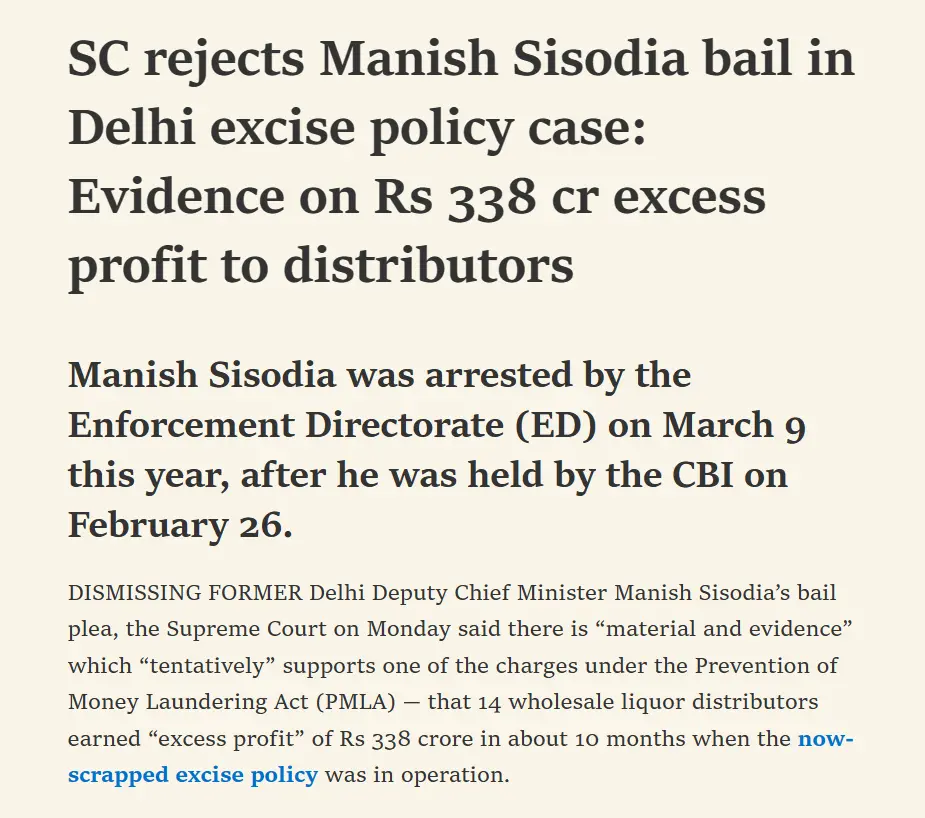
Shifting focus to Hemant Soren, revelations of WhatsApp conversations between the former Chief Minister of Jharkhand and an associate discussing kickbacks linked to the transfer postings of senior officers, along with involvement in illegal cartels for leaking details of state civil service examination aspirants, constitute evidence presented by the Enforcement Directorate (ED). Media reports indicate the existence of 539 pages of WhatsApp chats and 11 trunks filled with land deeds that contributed to the arrest of Hemant Soren.
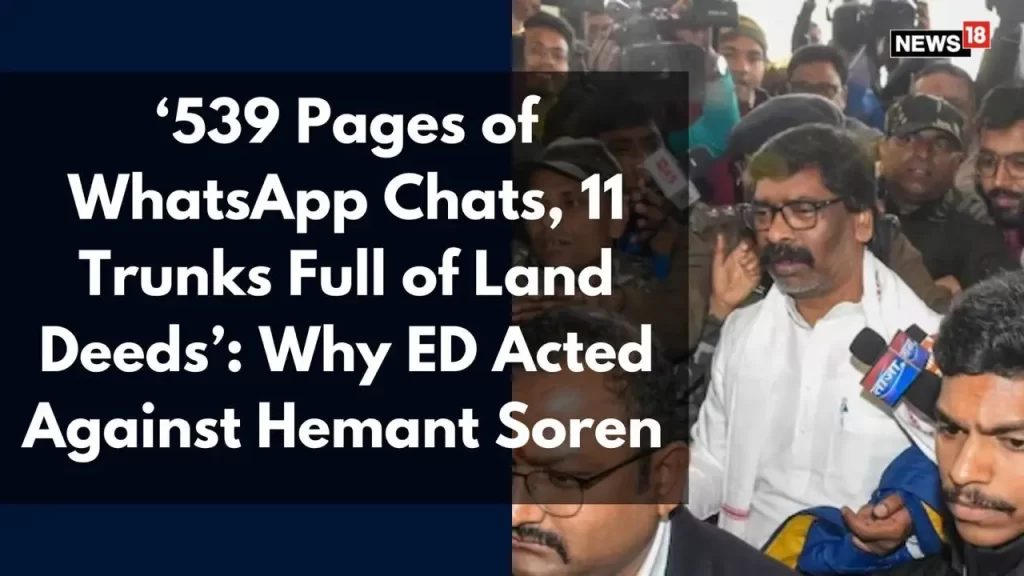
Claim 3: Dhruv Rathee asserts that the Modi government is actively undermining the federal structure by allegedly exerting undue influence through Governors and Lieutenant Governors (LGs). He specifically references the case of Kerala, where Governor Arif Mohammed Khan reportedly withheld approval for eight bills proposed by the Kerala government.
Fact: It is crucial to note that Article 200 of the Indian Constitution bestows constitutional authority upon the Governor to forward bills to the President for consideration, withholding assent, or returning them to the Legislative Assembly. The constitutional framework, as delineated in Article 200, outlines the procedure by which a bill passed by a State Legislative Assembly is presented to the Governor for approval, allowing the Governor the discretion to assent, withhold assent, or reserve the bill for the President’s consideration.

Claim 4: Dhruv Rathee contends that the Supreme Court, in a landmark decision, deemed electoral bonds unconstitutional, subsequently prohibiting their use for funding political parties. Following this ruling, media reports highlighted the Bharatiya Janata Party (BJP) as the primary beneficiary, receiving a significant share of approximately 55%, equivalent to around Rs 6,565 crore.
Fact: Notably omitted by YouTuber Rathee is the fact that political parties such as TMC DMK and BJD, received more than 90% to 100% of their political funding derived from electoral bonds. Additionally, considering the substantial representation of the ruling party’s Members of Parliament (MPs) and Members of Legislative Assemblies (MLAs), it is essential to acknowledge their proportionate accountability for securing more than 50% of electoral bonds.

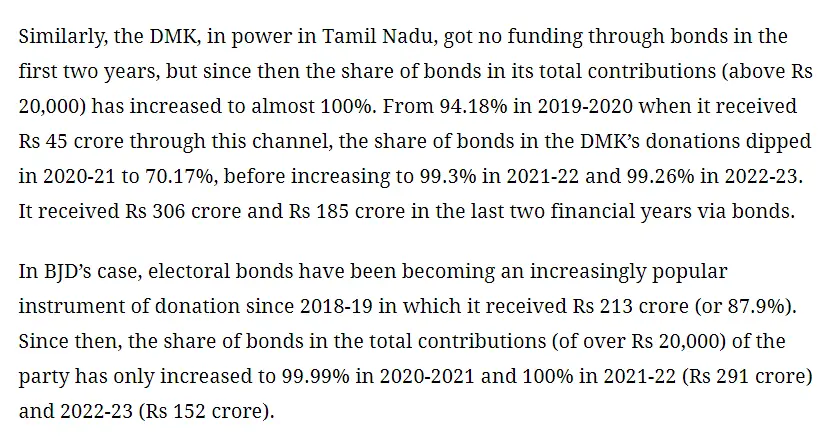
Claim 5: Dhruv Rathee contends that the Modi government introduced a bill that excluded the Chief Justice of India (CJI) from the process of appointing the Chief Election Commissioner (CEC). In 2023, the Supreme Court intervened, mandating the inclusion of the CJI, Leader of Opposition, and Prime Minister in the appointment process for both the CEC and Election Commissioners (EC).
Fact: Prior to the 2023 Supreme Court ruling, the appointment of the CEC and EC was exclusively determined by the ruling government. The bill presented by the Modi government introduced a notable change by allowing the Leader of the Opposition to participate in the selection process, a provision absent in previous procedures.

An Intriguing Anecdote: In the lead-up to the 2009 Lok Sabha elections, Chief Election Commissioner N. Gopalaswami recommended to then President Pratibha Patil the removal of Election Commissioner Navin Chawla, who was poised to assume the role of Chief Election Commissioner. Gopalaswami cited concerns about Chawla’s perceived partisan conduct favoring a specific political party. However, the president deemed the recommendation non-binding and rejected it. Subsequently, after Gopalaswami’s retirement the following month, Chawla assumed the position of Chief Election Commissioner and oversaw the 2009 Lok Sabha Elections.

Claim 6: Dhruv Rathee asserts that the government, particularly in the context of the ongoing farmers’ protest, is employing measures to quash dissent.
Fact: Contrary to this claim, Only Fact investigative reports have shed light on the political motivations behind the farmers’ protests, suggesting a linkage to the promotion of the Khalistan agenda. It is essential to acknowledge that the 2021 farmers’ protest endured for nearly a year, during which the government refrained from using force except for the incident on January 26 when advocates of Khalistan attempted to breach the Red Fort. It is crucial to consider these nuanced circumstances and events in evaluating the government’s approach to the protests.

Claim 7: Dhruv Rathee alleges that the government conducted surveillance on Ashok Lavasa’s phone following his dissent against Prime Minister Modi during his tenure as Election Commissioner in 2019.
Fact: It is pertinent to note that the sole source for this claim is The Wire, a media outlet with known leftist and communist leanings, raising questions about the veracity of the story. The Wire has been criticized for advancing an agenda that seeks to undermine India’s reputation both domestically and internationally. Importantly, no other media organizations have collaborated on or independently reported this story, and neither did the former election commissioner Ashok Lavasa confirm The Wire’s story. Additionally, it is noteworthy that Lavasa continues to be a vocal critic of the current government, expressing dissent through columns and articles, thereby complicating the narrative surrounding the alleged phone surveillance.
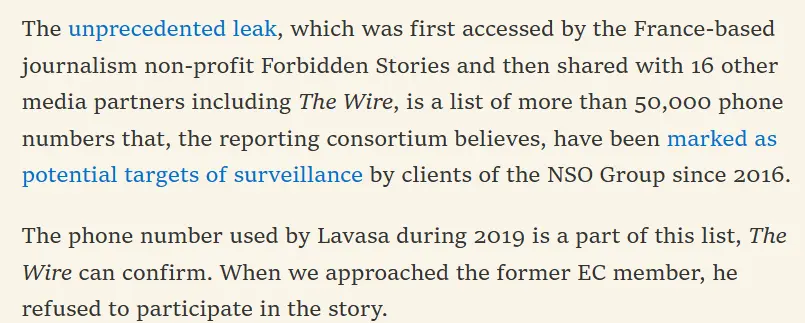
Claim 8: In Pune, the EVM machine was stolen, raising questions about the Election Commission.
Fact: The stolen EVM was for demonstration purposes, not for actual voting. Demo EVMs bear a distinct stamp indicating their purpose for training and awareness, stored separately from the EVMs used in polls. The accused, arrested in this case, mistakenly believed the briefcase containing the EVM held valuable items. Nonetheless, safeguarding the integrity and security of EVMs is crucial for democracy.
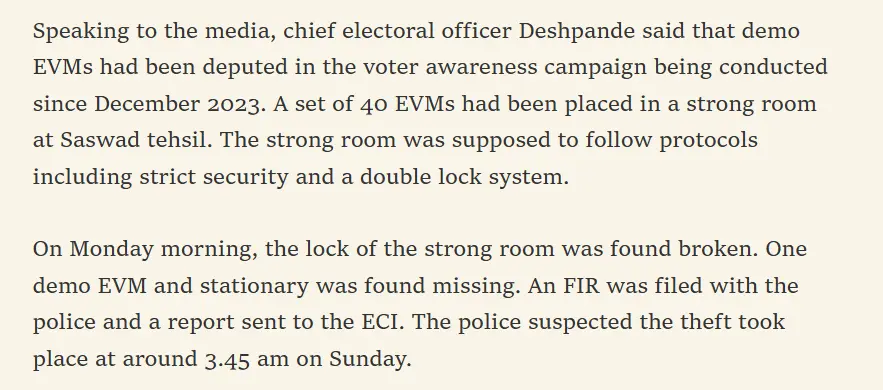
Claim 9: Dhruv Rathee claimed that, according to the CAG, about 7,50,000 Ayushman Bharat beneficiaries used the same or invalid mobile number.
Fact: The government clarified that mobile numbers are not required for Ayushman Bharat Pradhan Mantri Jan Arogya Yojana (AB-PMJAY) verification. The identification process relies on Aadhaar details, as PM-JAY is an entitlement-based scheme. The mobile number does not affect beneficiary eligibility or treatment claims. While some field workers may have entered random mobile numbers, it doesn’t impact the verification process.
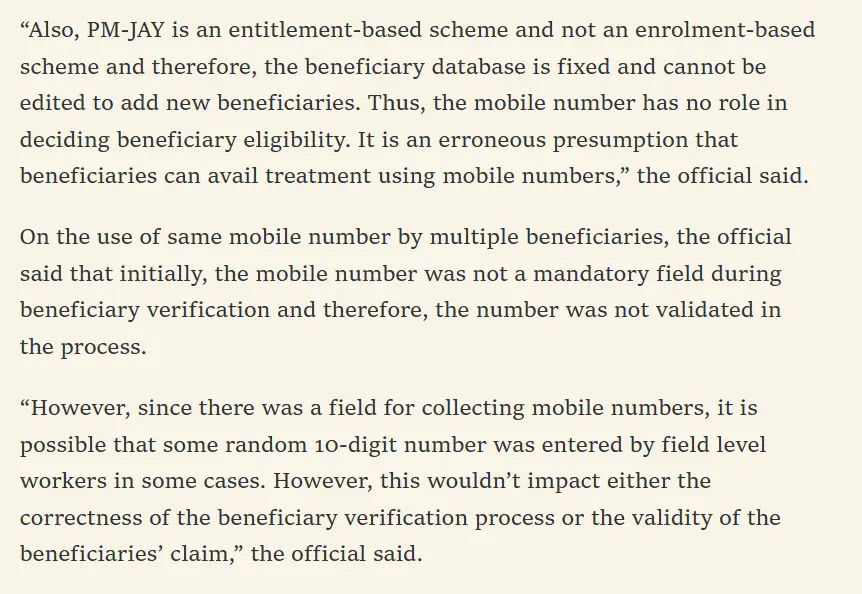
Claim 10: Referring to the recent Chandigarh Mayoral election fraud, Dhruv Rathee alleges democracy has been strangled for the first time in history.
Fact: The Chandigarh incident is condemnable, but historical instances like the emergency period and election fraud in West Bengal, where communist party and TMC workers looted or destroyed ballot papers and boxes, should not be forgotten. The Calcutta High Court, in a recent case, raised concerns about uncontested seats in West Bengal panchayat elections, prompting scrutiny by the state election commissioner. The court noted abnormal situations where only candidates from the ruling Trinamool Congress party could file nominations for numerous seats.
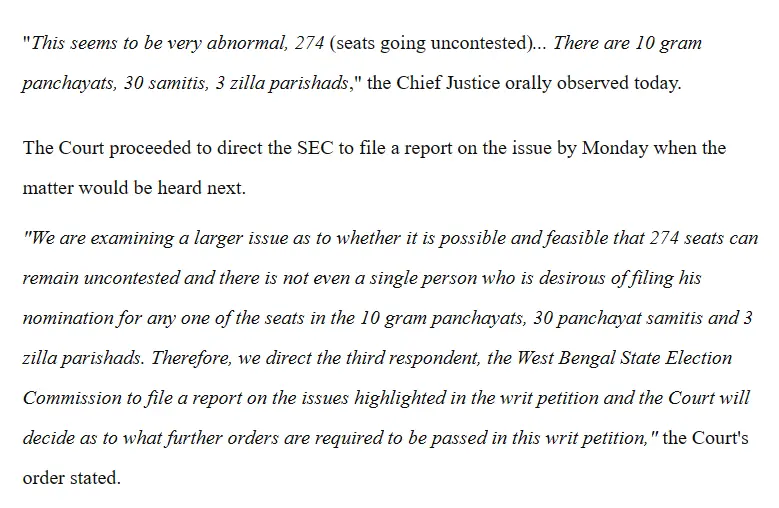
Conclusion:
Beyond the aforementioned seven assertions, YouTuber Dhruv Rathee introduces several other unsubstantiated claims that lack factual basis and are not deemed worthy of detailed exploration in this article. Notably, Rathee takes a moment in the video to affirm that he has not received financial backing from any political party for creating the content, a gesture that raises questions about the necessity for such reassurances. According to certain reports, Rathee is allegedly affiliated with the Aam Aadmi Party. This may elucidate his insistence on stating that the video is not funded by any political entity. However, we leave the connection between Dhruv Rathee and political parties to your imagination. Nevertheless, the unfounded claims in the recent video, seemingly crafted to incite controversy and instill doubt, pose a potential threat to the cohesive fabric of our democratic society.
| Claim | India’s democracy is in danger |
| Claimed by | Dhruv Rathee |
| Fact Check | Misleading |
Also Read: Image of Bullet Struck in Lid Not Associated with Ongoing Farmer Protest in India


